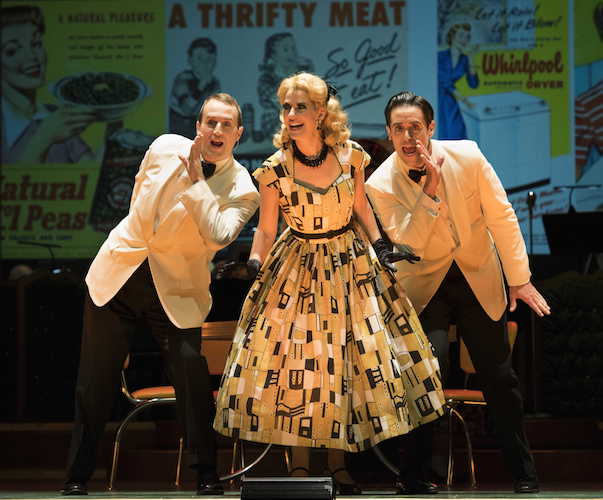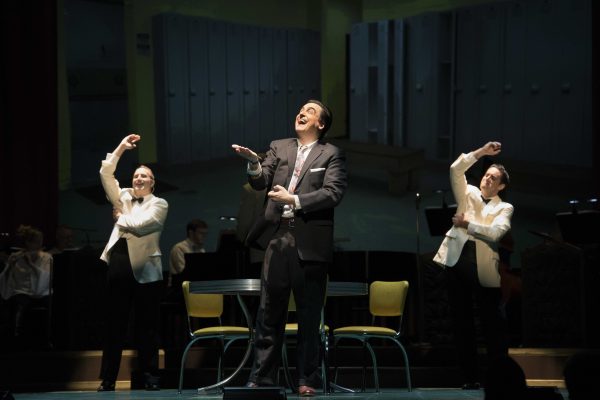Concert Review: Boston Lyric Opera’s all-Bernstein Double-bill
The BLO’s production was one of the troupe’s true staging triumphs of late, transforming the Steriti Ice Rink into a 1950s-style nightclub.
Trouble in Tahiti/Arias & Barcarolles Presented by Boston Lyric Opera, DCR Steriti Memorial Rink, Boston, MA, closed.

Vincent Turregano, Mara Bonde, and Neal Ferreira comment on the action in Boston Lyric Opera’s “Trouble in Tahiti/ Arias and Barcarolles.” Photo: Liza Voll.
By Jonathan Blumhofer
On the surface of it, Leonard Bernstein’s Trouble in Tahiti and Arias and Barcarolles, which Boston Lyric Opera (BLO) presented in a double-bill as its final production of the season last week at the North End’s CDR Steriti Memorial Ice Rink, make for rather strange bedfellows
The former is a satirical one-act opera, written when Bernstein was in his mid-thirties, just married, and starting to crest the wave of his celebrity. Its subject matter is dark, observing a day in the lives of Sam and Dinah, a prototypical middle-class couple whose idyllic, suburban, all-American-Dream lifestyle masks a crumbling marriage. But the music isn’t grim at all: sometimes sad, yes, but unfailingly lyrical and often underpinned by the rhythms and harmonies of jazz.
Arias and Barcarolles, on the other hand, dates from the end of Bernstein’s life. By the time of the song cycle’s 1988 premiere, Bernstein was a legend, but decades of hard living were starting to take their toll, and the brash, confident musician of the ‘50s and ‘60s had given way to a far more jaded and controversial figure.
Still, there’s no real bitterness to be found in Arias and Barcarolles’ eight movements. A sober rumination on human relationships from a variety of perspectives, the music surveys a wide range of idioms, from serene diatonicism to wrenching 12-tone writing and nostalgic lyricism, before ending in an affectingly simple waltz.
How do such stylistically and chronologically distant pieces relate, then?
Well, when Arias and Barcarolles is slightly tweaked to present a new perspective on Trouble in Tahiti’s characters, and both are sung as strongly as they were by BLO’s leads on Friday night, the two scores connect very well, indeed. In fact, I’d go so far to say that, in terms of theatrical concept and for shining a fresh light on Bernstein the composer, this double-bill is the most thought-provoking and satisfying presentation of Bernstein’s music in Boston yet this anniversary year.
It certainly helps that Trouble in Tahiti and Arias and Barcarolles feature some of the finest texts that Bernstein wrote and set. He wasn’t always a successful poet – the Kaddish Symphony, Mass, and A Quiet Place all have textual problems – but, in both these pieces, Bernstein was on his best behavior. Indeed, Trouble in Tahiti stands as one of his finest stage works: emotionally direct, dramatically uncluttered, serious in theme but totally unpretentious in execution. Arias and Barcarolles is much the same, and a bit more personal to boot, including a story attributed to Bernstein’s mother, Jennie.
And his music for in each is similarly strong.
Trouble in Tahiti is cut from the same cloth as On the Town and Wonderful Town, effervescent and tuneful. The opera’s plot follows the characters through their day: arguing at the breakfast table, Sam at the office, Dinah at her psychiatrist, the two bumping into each other unexpectedly at lunchtime before Sam runs off to the gym and Dinah goes to the movies. At the end, they come home, try to have a serious conversation, fail, and, as an alternative, head back out to the cinema. Throughout, a trio of vocalists jazzily hymn the materialistic joys of suburban living.
Friday’s performance struck a powerful contrast between the upbeat, almost insistent refrains of the ensemble – sung with pep and bright color by Mara Bonde, Neal Ferreira, and Vincent Turregano – and the reality of Sam and Dinah’s bitter experience. Sometimes the outer world crept in, too, like when warnings about fallout shelters and imminent nuclear attack flashed on the screen behind the stage while the three sang about the “wonderful life” of affluent, post-war America.
As the couple, Marcus Deloach and Heather Johnson were well-matched. Both sang with intensity and character.
Deloach presented a thoroughly egotistical Sam, straight out of Mad Men, whose focus is only on himself and his accomplishments (winning a handball tournament ranking high on that list). His robust account of “There’s a law,” in which Sam seeks a measure of self-justification, boasting that his behavior is only an extension of his naturally-endowed disposition as a “winner,” powerfully defined the character.
Johnson’s Dinah was somewhat more sympathetic, but similarly flawed: she skips out on her son’s school play (after berating Sam for doing the same) to watch a movie. That fictional film, “Trouble in Tahiti,” gives the opera its name and Dinah her big show-stopper, “What a movie!,” in which she bemoans the sentimental stupidity of what she saw on-screen, even as she’s clearly moved and entranced by it. Johnson sang the aria with lightness and vigor. She also gave a touching account of “I was standing in a garden,” Dinah’s monologue to her psychiatrist.
Together, the pair’s opening breakfast argument was spirited, and their two duets, “Well, of all people” and “Evening Shadows,” intensely sung.
While you might want the couple to resolve their problems before the curtain falls, they don’t (or can’t), either in Trouble in Tahiti or, later, in Bernstein’s sequel, A Quiet Place. But BLO’s production, which was directed by David Schweizer, provided some sense of closure by placing Arias and Barcarolles immediately after the last bars of “Evening Shadows” faded away.
Theirs was close to Bernstein’s original setting of the piece for two singers and piano four-hands, though it incorporated the trio into the proceedings, as well, and, in one song (“Oif Mayn Khas’neh”), featured a new orchestration by BLO conductor David Angus. Each of the eight numbers were designed to correspond to a scene in Trouble in Tahiti, adding a bit more nuance to the characters’ stories.
It’s a fresh, creative approach to Arias and Barcarolles even if it had some incongruities. Deloach singing “The Love of My Life” while pretending to talk on the phone at the office didn’t make much sense. The trio’s involvement in the proceedings (dancing, singing a few phrases, playing the rambunctious kids in “Mr. and Mrs. Webb Say Goodnight”) was superfluous and forced. And some of the name changes BLO’s creative team made in the songs were inconsistent.

In the locker room showers, Marcus DeLoach (as “Sam”) and his buddies celebrate the benefits of being male in Boston Lyric Opera’s “Trouble in Tahiti/ Arias and Barcarolles.” Photo: Liza Voll.
That said, especially as Arias and Barcarolles proceeded, the conceit was effective.
The “Love Duet” made for a neat counterpoint to Trouble in Tahiti’s breakfast scene, with an argument between the two singers that’s more nuanced and rational. Having Sam sing “Oif Mayn Khas’neh” as a reminiscence of his wedding to Dinah was a nice touch. Johnson’s account of “Greeting,” a short ode to the miracle of birth, was ethereal. The duo’s interpretation of “Mr. and Mrs. Webb Say Goodnight” made its own stark contrast to the closing scene of Trouble in Tahiti; here’s what Sam and Dinah might sound like if they could actually start talking with one another. And the closing “Nachspiel,” in which all five singers hummed a descant to a slow waltz, brought the whole event to a meditative close.
As for the production itself, it marked one of BLO’s true staging triumphs of late, transforming the Steriti Ice Rink into a 1950s-style nightclub: round tables on the floor in front of the stage and tiers of seats at straight tables on the sides. The reduced orchestra, which was anchored by Brett Hodgdon’s fantastic keyboard playing and snappily led by conductor Angus, sat in back behind the singers.
Throughout the night, the company made good use of the whole space and its minimal sets: a table and chairs, a model of a little white house (carried around by the trio), and a screen behind the stage projecting various images (a kitchen, an office, etc.) and period advertisements from the ‘50s.
The simplicity of the last had the effect of inviting you in to the story while allowing you to focus, above all, on the music and narrative being told. Given the timeliness of the double-bill’s themes – the complications of human relationships, the difficulties of communication, connecting meaningfully with people in a hyper-materialistic culture – that was a welcome approach.
Jonathan Blumhofer is a composer and violist who has been active in the greater Boston area since 2004. His music has received numerous awards and been performed by various ensembles, including the American Composers Orchestra, Kiev Philharmonic, Camerata Chicago, Xanthos Ensemble, and Juventas New Music Group. Since receiving his doctorate from Boston University in 2010, Jon has taught at Clark University, Worcester Polytechnic Institute, and online for the University of Phoenix, in addition to writing music criticism for the Worcester Telegram & Gazette.
Tagged: Arias and Barcarolles, Boston-Lyric-Opera, Leonard Bernstein
